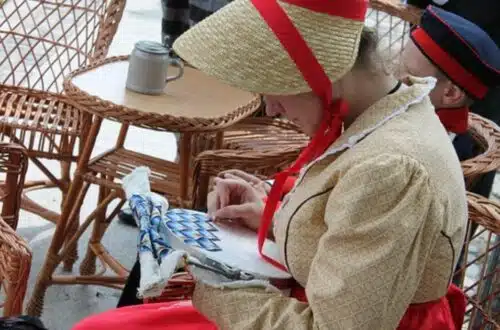Fat Thursday: Poland’s Unique Tradition
You’ve just settled into your cozy apartment in Warsaw after a long flight and decided to take a stroll around the city. It’s a beautiful Thursday night in February, and virtually every street corner is buzzing with activities. Locals seem to be happy, and some are dressed in elaborate costumes. You picked up a nice scent and wondered what it could be. Out of curiosity, you ask a passer-by, and he replies that it is Fat Thursday in Poland.
What is Fat Thursday?
Fat Thursday, known locally as Tłusty Czwartek, adds to the long list of national holidays, festivals, and traditions in Poland. It is a festival linked to the church calendar. On this day, locals and tourists alike feast on all kinds of fatty, sugary food and drink alcohol before Lent (the Christian festival).
During Lent, most people abstain from all forms of immoral acts and avoid eating meat and taking alcohol. Others continue to indulge in eating meat and taking alcohol during Lent. It’s a choice. Traditionally, every Polish celebrates Fat Thursday, regardless of whether or not they are going to follow through with Lent’s penance.
All bakeries get busy with orders on the Wednesday before the event. On Fat Thursday itself, you have to wait long lines at bakeries to get your orders fulfilled. On this day, expect to indulge in a wide range of delicious Polish food, as much as your tummy can take. The most popular of the food include Faworki (“angel wings,” pastry with sugar) and Pączki (filled doughnuts).
Who Is It For?
Fat Thursday is celebrated by locals and Polish people living overseas. Tourists and immigrants who reside in Poland are also not left out of the celebration. Fat Thursday is indeed a popular celebration amongst Polish people. It is a day to merry; it is a day when tourists marvel at the colorful traditions and cultural heritage Poland has to offer.
When Is Fat Thursday and Is It a Poland-only Event?
Fat Thursday is an annual event. It does not have a fixed date. The exact date depends largely on the Christian calendar. The event is linked to Lent and Easter. Fat Thursday takes place on the last Thursday before Ash Wednesday, just before Lent rolls in.
However, it is important to note that Fat Thursday is celebrated by other countries worldwide. Other countries that celebrate this annual event or its equivalent include Spain, Italy, Sweden, Germany, and Greece.
Polish people living in other countries celebrate this event as well. Notable areas to experience Polish Fat Thursday include Chicago and New York. On this day, the doughnut is the main dish.
Fat Thursday FAQs
Many people opine that the happiest place in the world is Disneyland. Perhaps, they are right. But one thing is sure that during one specific day of the year, the world’s happiest place is in Poland. Fat Thursday is, without a doubt, a favorite day for the Polish people. If you’ve never been to Poland, you might have no idea what Poles do on this day.
Here is a breakdown of the things you need to know about Fat Thursday
Why do poles celebrate Fat Thursday?
Polish people celebrate Fat Thursday not only cause of their fondness for the doughnut but because it is a religious celebration. It is seen as the last day before Lent to eat as much sugary and fatty foods as possible. The reason is that Catholics will abstain from alcohol and meat a couple of weeks before Easter.
It is a period of fasting for religious-minded people. One good thing about this celebration is that religious and non-religious people celebrate it. In other words, it is a nationwide celebration, open to all and sundry.
When is Fat Thursday?
Fat Thursday is celebrated on the last Thursday before Lent. The specific date depends on the Christian calendar. Upcoming dates for Fat Thursday in the coming years
2022 – 24th of February
2023 – 16th of February
2024 – 8th of February
On this day, be prepared to wait in line for hours to buy the tasty doughnuts, paczki, and Faworki.
What is the most commonly consumed food on Fat Thursday?
There are mainly two main types of Polish foods, Paczzek and Faworki.
Paczek is a fried doughnut glazed with sugar, typically filled with rose marmalade and covered with candied orange peel. It comes in many varieties. Legends have it that bad luck awaits anyone who does not eat at least one paczek on this day for the rest of the year. Many big businesses in Poland present this traditional doughnut to staff and clients.
Faworki, otherwise known as angel wings, is yet another favorite delicacy amongst locals. They are tasty little crisps of fried pastry sprinkled with powdered sugar and come in twisted ribbon shapes.
Be sure to give these special treats a try on Fat Thursday.
Is it mandatory to eat a doughnut on this day?
The truth is, you have a choice to make. No one will force this delicious dough down your throat, but it is highly recommended that you fill your taste bud with at least one.
Locals believe that if you don’t eat one faworki or paczek on Fat Thursday, the rest of the year will be filled with regrets and bad luck. So do you want to risk an entire year of bad luck just for refusing to eat just one doughnut?
Is Fat Thursday the same as Fat Tuesday?
Fat Thursday is a Polish traditional event celebrated on Thursday. In countries like USA or Canada, this celebration is known as Pancake Tuesday or Fat Tuesday.
Though this tradition follows a similar principle, the only difference is that Fat Tuesday is celebrated a day before Ash Wednesday while Fat Thursday takes place on the last Thursday before Ash Wednesday.
So, if you are planning your next trip to Poland, make sure it coincides with the Fat Thursday celebration. You will enjoy every bit of it. That’s a guarantee.





